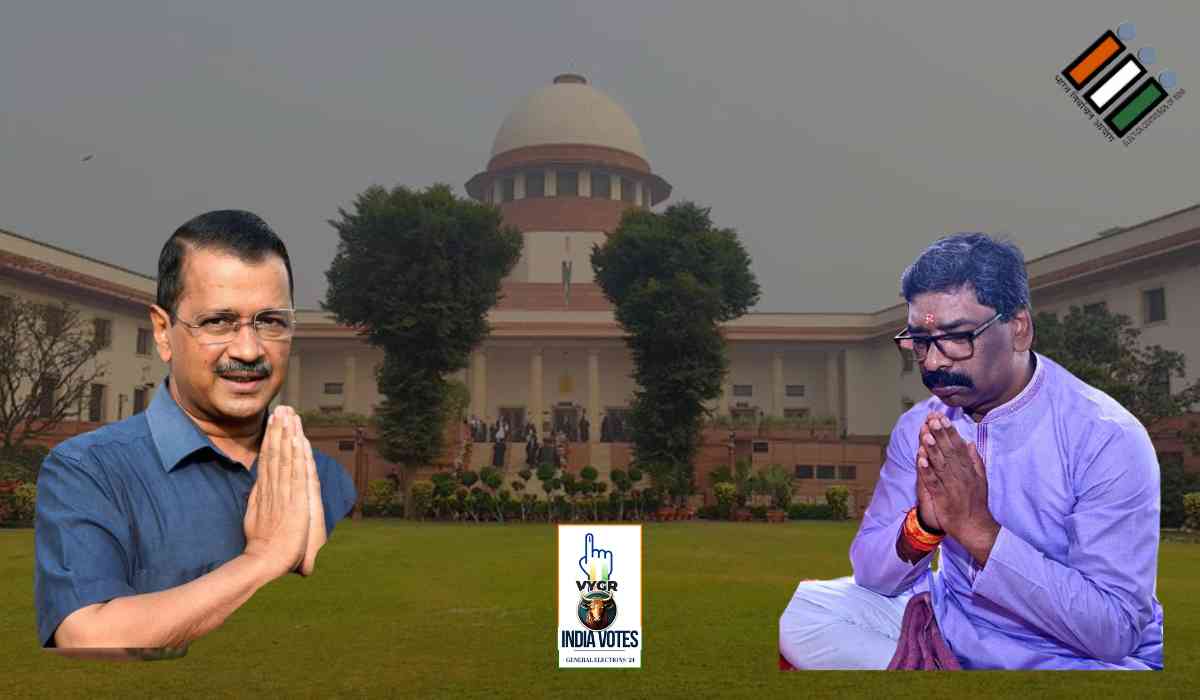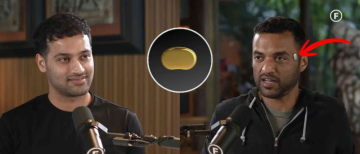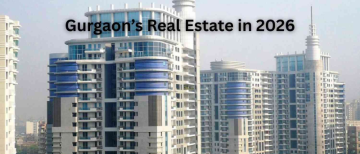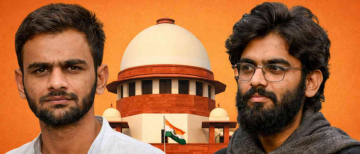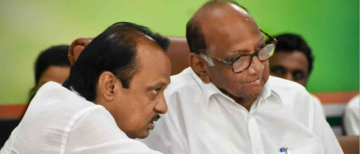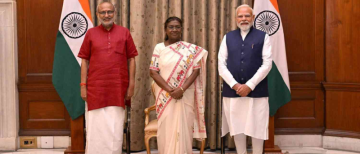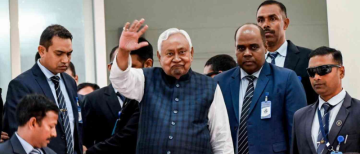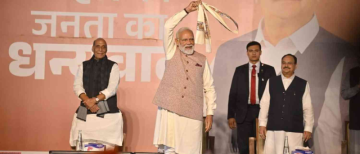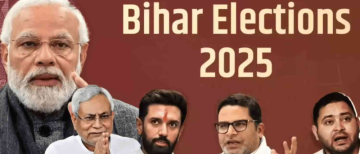The Supreme Court has involved itself in high-stakes cases dealing with Arvind Kejriwal and Hemant Soren, thereby captivating the nation. For Delhi Chief Minister Arvind Kejriwal, the nightmare began on March 21, when he was detained by the Enforcement Directorate (ED) for money laundering under the nixed Delhi excise policy. But it hasn’t stopped there; he’s taken his fight all the way up to the apex court of India, where a bench comprising Justices Sanjiv Khanna and Dipankar Datta is hearing his plea against arrest and incarceration.
Read more: Supreme Court In Arvind Kejriwal Case: No Relief, Next Hearing Scheduled For April 29
Kejriwal refuses to believe that he was 'wrongfully' arrested and that this event constitutes an assault on democracy as such, even after its affirmation by the Delhi High Court. His struggle for a clean chit shows how deeply he cares about his principles.
Meanwhile, Hemant Soren is slated to come before SC today; the former Jharkhand chief minister was taken into custody by ED over charges related to land scamming, which makes it appear as though time is of utmost urgency because state elections have been stretched out so much and still await a decision from Jharkhand HC regarding him, who has been languishing in jail since January 31 on allegations of money laundering arising out of land deal irregularities committed during his tenure as CM.
For more on this, read: CM Hemant Soren Chairs Meeting Amidst ED Probe, Denounces Summons As Abuse Of Legal Power
ARVIND KERJIWAL SC CASE
30th April'24
- SC raises questions about the timing of Delhi CM's arrest ahead of the general elections.
The Supreme Court, after hearing arguments from Delhi CM Arvind Kejriwal's lawyer, Abhishek Singhvi, expressed concerns about the timing of the arrest, particularly its proximity to the general elections. Justice Khanna emphasised the importance of liberty and urged ASG Raju, representing the ED, to be prepared with a response regarding the timing of the arrest.
"Liberty is exceedingly important; you can't deny that. The last question pertains to the timing of the arrest, as highlighted by them. The timing of the arrest, soon before the general elections,"
- Justice Khanna responds to Singhvi's arguments, noting the time gap between proceedings and complaints filed. He questions whether criminal proceedings can be initiated without adjudicatory proceedings. Emphasises the high threshold of Section 19 and confrontations with Section 45, stating;
“You have to show how petitioner was... what they believe is the threshold of Section 19 is fairly high... they will be confronted with Section 45... that's why they are repeatedly coming against arrest.”
- Justice Khanna made the following remarks:
"Criminal proceedings cannot exist independently... unless there is confiscation or attachment."
and explained the procedural framework, stating that attachment of assets should precede any offence and subsequent finding of guilt. Prosecution should follow the attachment.
- Singhvi and Justice Khanna discuss the handling of cases amidst perceived reluctance and concern.
* Singhvi, discussing Manish Sisodia's case judgement, points out, 'In the summary of Sisodia's case, there was nothing about Delhi CM.'
* Justice Khanna responds, 'Initially, I considered whether I should handle this case since I decided the previous one. Then I realised it might be misconstrued as my reluctance.'
- Advocate Singhvi asserts that 'Sisodia's liquor policy statement is unrelated to Delhi CM' during SC hearing on Kejriwal's plea against ED arrest. Justice Khanna mentions Sisodia's sequence on policy formulation, to which Singhvi responds,
“Factually, that judgment is not relevant to me.”
- Arvind Kejriwal's lawyer, Advocate Singhvi, representing the Delhi CM during the Supreme Court hearing on the plea against his arrest by the ED, asserts,
“There is no evidence that directly implicates me. The association with Vijay Nair is portrayed as if Nair and Kejriwal are synonymous.”
- Singhvi highlights Sarath Reddy's statement, stating,
There is a lack of specificity, dates, or addresses. At most, it does not assert that Kejriwal demanded money. It's suggestive. Where is the legal basis here?"
- Singhvi highlighted that certain statements were not included in any prosecution complaint, indicating that they may not be relied upon as evidence.
“These statements are hidden and omitted by the ED, not included in the prosecution complaint. Just because they made the complaint lengthy, does it make it less incriminating?”
- Justice Khanna, addressing ASG Raju representing the ED, says,
“His point is that the grounds of arrest should also include facts that support his case. You might be correct, that's his argument. We are not certain.”
- Singhvi, representing Delhi CM started today's hearing by stating;
I gave 5 names, father Magunta, son Raghav, Sarath Reddy...my chart refers to them. See the circumstances in which the statements were given, the inducement.
29th April'24
Kejriwal's lawyer requests more time; the Supreme Court adjourns the hearing for tomorrow (30th April'24).
Singhvi, representing Delhi CM Arvind Kejriwal, firmly states, "The denial of interim protection by a court cannot be a ground for arrest." He emphasises,
"I (Kejriwal) have a right to make legal mistakes. I was arrested the day I was unable to get interim protection from the Delhi High Court. The ground for arrest should be positive and culpatory, not because I was unable to get interim protection."
He goes on to say,"ED’s power to summon under Section 50 of the PMLA does not include the power to arrest under Section 19."
Singhvi questions whether Kejriwal's arrest was necessary, "You came to my house for 10 hours to question me and then arrest me. Could you not have come to take my statement? From October 2023 to March 2024, you sent me summons." He said, "My question is, where is the material revealing ground for arresting me?"
Regarding the reliance on statements made by co-accused, Singhvi asserts,
"The case rests on statements made by co-accused persons. However, such statements must be corroborated." He adds, "What was the necessity to arrest? This was not a hardened criminal or a terrorist."
Singhvi underscores the need for an objective consideration of favourable and unfavourable factors before arrest, stating, "The cardinal principle in criminal law is to let a hundred guilty people go free but not let one innocent person be punished."
He further argues,
"No new incriminating material has been presented by the ED."
Singhvi also highlights, "Approver Sarath Reddy bought electoral bonds," and points out, "While flagging that he is not bringing politics to court, persons who have turned approvers in the case have family members who have joined the ruling party at the Centre."
Finally, Singhvi confirms, "The arrest is illegal under Section 19 of the PMLA."
- The bench, consisting of Justices Sanjiv Khanna and Dipankar Datta, will consider Mr. Kejriwal's request for a hearing. The appeal from the Delhi Chief Minister is numbered 53.
_1714391638.png)
HEMANT SOREN SC CASE
The Supreme Court issued notice on a petition filed by former Jharkhand Chief Minister Hemant Soren challenging his arrest by the Enforcement Directorate (ED).
The case was postponed by Justices Sanjiv Khanna and Dipankar Datta for the week beginning on May 6, enabling the Jharkhand High Court to deliver the judgement that was set aside for February 28, 2024.
During the hearing, Soren requested temporary release on bond, stating
“Where is money laundering? Where are the allegations against me? I want interim bail,”.
Senior Advocate Kapil Sibal argued that there was insufficient evidence to link Soren to the purported land scam.
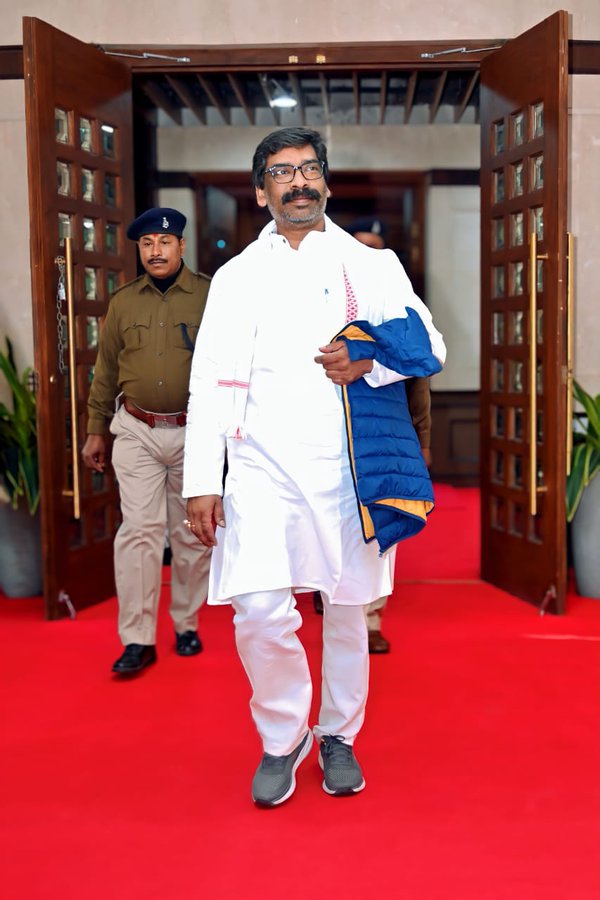
Context:
In relation to the fraudulent purchase of land, Soren was detained by the ED on January 31st, which resulted in his resignation as Chief Minister.On February 2, Soren went to the Supreme Court after being arrested, but the Court told him to go to the High Court for relief instead.
After that, Soren went before the Jharkhand High Court, which postponed making a decision until February 28. The urgency of the situation was underscored by Senior Advocate Kapil Sibal, citing Soren's detention during a crucial election period.
The alleged accusations:
The Enforcement Directorate (ED) claims that the 8.5 acres of land in question are proceeds of crime, and Hemant Soren is facing money laundering allegations connected to an illegal mining case and a land scam in Ranchi. Soren is charged by the ED with actively conspiring to obfuscate the original documentation in order to validate the acquired property.
Media Credits: multiple agencies, X
ⒸCopyright 2024. All Rights Reserved Powered by Vygr Media.

